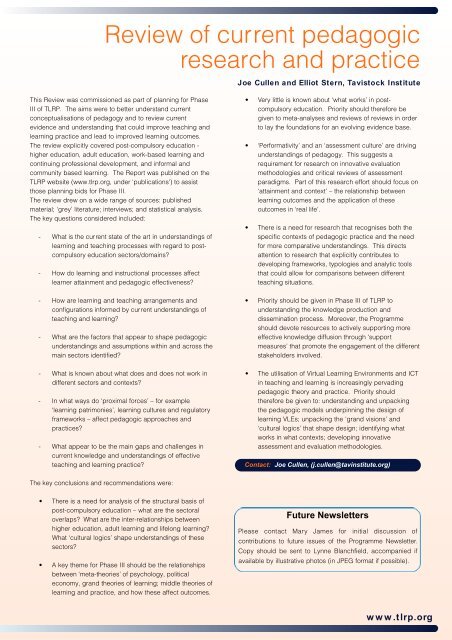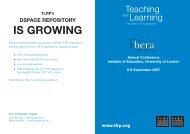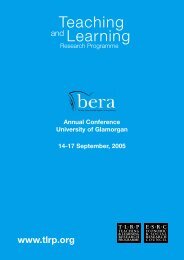How do people learn at work?M a rtyn Sloman <strong>and</strong> John KanefskyIn January <strong>and</strong> February 2002 three one-day workshops wereheld to discuss future priorities for research into learning at theworkplace. They were jointly sponsored by the CharteredInstitute of Personnel <strong>and</strong> Development (CIPD) <strong>and</strong> TLRP.Two were held in London <strong>and</strong> one in Edinburgh. Some 120people participated: half workplace learning practitioners orconsultants, half academics with an interest in research onlearning.The workshops began with a review of the implications of therecent re s e a rch re p o rt ‘How Do People Learn’, commissionedby the CIPD, <strong>and</strong> produced by Cambridge <strong>Programme</strong> forI n d u s t ry. These discussions looked at ways new competitivemodels <strong>and</strong> the increasing capability of learning technologya re creating new opportunities <strong>and</strong> imperatives for impro v i n gthe effectiveness of learning delivery in organisations. Mosti m p o rt a n t l y, there is a shift in focus to the individual learn e r.P a rticipants agreed that relevant, appropriate <strong>and</strong> accessiblere s e a rch is essential to address these changes <strong>and</strong> to targ e to rganisational eff o rt <strong>and</strong> re s o u rces eff e c t i v e l y, although theu rgency of the dem<strong>and</strong> was contrasted with the long termn a t u re of much re s e a rch evidence.In the second half of the workshops, participants were askedto identify priority re s e a rch issues. The output was capture df rom a dozen small-group discussions spread across thet h ree events. The suggestions were inevitably varied <strong>and</strong>d i ffuse. However some important themes emerged, albeitwith a wide degree of overlap <strong>and</strong> synerg y.Theme I: Effective <strong>Learning</strong> InterventionsGiven the shift in focus to the learner, how can interventionsfrom the organisation encourage effective learning? Threemain topics emerged. First, a number of workshop groupsgave priority to the balance <strong>and</strong> relationship between informal<strong>and</strong> formal learning in the workplace. Secondly, there was aninterest in the role of line managers in facilitating / supportinglearning. The third topic was making sense of 'blendedlearning'. We need to underst<strong>and</strong> / evaluate whether <strong>and</strong> howblending different learning components (work shadowing /coaching as well as e-learning <strong>and</strong> the classroom) canimprove outcomes for learners <strong>and</strong> organisations.Theme II: Organisational Culture <strong>and</strong> <strong>Learning</strong>Participants discussed what is an effective learningenvironment <strong>and</strong> what steps can be taken by organisations tocreate such environments. Another important str<strong>and</strong>concerned the link between individual <strong>and</strong> collective learning –<strong>and</strong> the difficulties in making operational sense of the laternotion. All these flow into the need to identify differentorganisational styles <strong>and</strong> approaches to learning <strong>and</strong> theimportance of hierarchy in determining learning needs.A consideration that was repeatedly raised is how the age ofthe individual (<strong>and</strong> previous good <strong>and</strong> bad experiences oflearning) can affect willingness to learn <strong>and</strong> the approach tolearning. There is an evident link here with the next issue.Theme III: Motivation to learn in organisationsThe central questions here are easily stated. Why, in someorganisations, do individuals seem more motivated to learn <strong>and</strong>more committed in their learning? What are the factors thatcreate this response from individuals? What are the keybarriers <strong>and</strong> enablers <strong>and</strong> who, in the organisation, canremove the barriers <strong>and</strong> promote effective learning.If these questions are addressed it should be possible to framean agenda for action for individuals, organisations <strong>and</strong>Government. Most importantly it will allow practitioners todetermine their most effective response to promote <strong>and</strong>facilitate individual (learner-centred) learning in theirorganisations. <strong>Learning</strong> style is clearly of importance inexploring this issue.Theme IV: Linking <strong>Learning</strong> with outcomesM e a s u rement <strong>and</strong> the evaluation of training / learning is an issueof high importance to practitioners, but participants re c o g n i s e dthis as a complex problem <strong>and</strong> rarely done well. Some felt that,despite the practical difficulties, this issue remained much tooi m p o rtant to be sidelined <strong>and</strong>, more o v e r, the new learn i n ge n v i ronment in organisations off e red an opportunity for a fre s ha p p roach or a revisit of the ideas in their new context.Theme V: Workplace learning in its wider contextParticipants also looked to the wider economic context <strong>and</strong> toexplore the boundaries of learning. Topics put forwardincluded: the importance of learning to Scotl<strong>and</strong>’s role in theglobal economy; the growing importance for economic growthof 'soft' skills <strong>and</strong> the way that they can be learned / taught; theneed to create mechanisms <strong>and</strong> communities to improveeducators <strong>and</strong> trainers. The transition from education /curriculum to work-based learning was seen as important forall these topics.Two comparatively well-rehearsed topics were the subject ofconsiderable discussion across all three workshops. The firstwas access issues <strong>and</strong> the need to ensure that no group isexcluded from participation in new learning opportunities. Thesecond was the need to take account of the particularproblems faced by small <strong>and</strong> medium sized enterprises(SMEs) <strong>and</strong> to ensure that they are not left behind in theimprovements in learning organisation <strong>and</strong> technology.The CIPD <strong>Research</strong> Report "How do People Learn?" isavailable from Plymbridge Distributors (<strong>Te</strong>l: 01752 202301) <strong>and</strong>an abbreviated version is available for downloading free onwww.cipd.co.uk.Contacts:M.Sloman@cipd.co.ukJ.W.Kanefsky@ex.ac.ukwww.tlrp.org
Review of current pedagogicresearch <strong>and</strong> practiceJoe Cullen <strong>and</strong> Elliot Stern, Tavistock InstituteThis Review was commissioned as part of planning for PhaseIII of TLRP. The aims were to better underst<strong>and</strong> currentconceptualisations of pedagogy <strong>and</strong> to review currentevidence <strong>and</strong> underst<strong>and</strong>ing that could improve teaching <strong>and</strong>learning practice <strong>and</strong> lead to improved learning outcomes.The review explicitly covered post-compulsory education -higher education, adult education, work-based learning <strong>and</strong>continuing professional development, <strong>and</strong> informal <strong>and</strong>community based learning. The Report was published on theTLRP website (www.tlrp.org, under 'publications') to assistthose planning bids for Phase III.The review drew on a wide range of sources: publishedmaterial; ‘grey’ literature; interviews; <strong>and</strong> statistical analysis.The key questions considered included:- What is the current state of the art in underst<strong>and</strong>ings oflearning <strong>and</strong> teaching processes with regard to postcompulsoryeducation sectors/domains?- How do learning <strong>and</strong> instructional processes affectlearner attainment <strong>and</strong> pedagogic effectiveness?- How are learning <strong>and</strong> teaching arrangements <strong>and</strong>configurations informed by current underst<strong>and</strong>ings ofteaching <strong>and</strong> learning?- What are the factors that appear to shape pedagogicunderst<strong>and</strong>ings <strong>and</strong> assumptions within <strong>and</strong> across themain sectors identified?- What is known about what does <strong>and</strong> does not work indifferent sectors <strong>and</strong> contexts?- In what ways do ‘proximal forces’ – for example‘learning patrimonies’, learning cultures <strong>and</strong> regulatoryframeworks – affect pedagogic approaches <strong>and</strong>practices?- What appear to be the main gaps <strong>and</strong> challenges incurrent knowledge <strong>and</strong> underst<strong>and</strong>ings of effectiveteaching <strong>and</strong> learning practice?• Very little is known about ‘what works’ in postcompulsoryeducation. Priority should therefore begiven to meta-analyses <strong>and</strong> reviews of reviews in orderto lay the foundations for an evolving evidence base.• ‘Performativity’ <strong>and</strong> an ‘assessment culture’ are drivingunderst<strong>and</strong>ings of pedagogy. This suggests arequirement for research on innovative evaluationmethodologies <strong>and</strong> critical reviews of assessmentparadigms. Part of this research effort should focus on‘attainment <strong>and</strong> context’ – the relationship betweenlearning outcomes <strong>and</strong> the application of theseoutcomes in ‘real life’.• There is a need for research that recognises both thespecific contexts of pedagogic practice <strong>and</strong> the needfor more comparative underst<strong>and</strong>ings. This directsattention to research that explicitly contributes todeveloping frameworks, typologies <strong>and</strong> analytic toolsthat could allow for comparisons between differentteaching situations.• Priority should be given in Phase III of TLRP tounderst<strong>and</strong>ing the knowledge production <strong>and</strong>dissemination process. Moreover, the <strong>Programme</strong>should devote resources to actively supporting moreeffective knowledge diffusion through ‘supportmeasures’ that promote the engagement of the differentstakeholders involved.• The utilisation of Virtual <strong>Learning</strong> Environments <strong>and</strong> ICTin teaching <strong>and</strong> learning is increasingly pervadingpedagogic theory <strong>and</strong> practice. Priority shouldtherefore be given to: underst<strong>and</strong>ing <strong>and</strong> unpackingthe pedagogic models underpinning the design oflearning VLEs; unpacking the ‘gr<strong>and</strong> visions’ <strong>and</strong>‘cultural logics’ that shape design; identifying whatworks in what contexts; developing innovativeassessment <strong>and</strong> evaluation methodologies.Contact: Joe Cullen, (j.cullen@tavinstitute.org)The key conclusions <strong>and</strong> recommendations were:• There is a need for analysis of the structural basis ofpost-compulsory education – what are the sectoraloverlaps? What are the inter-relationships betweenhigher education, adult learning <strong>and</strong> lifelong learning?What ‘cultural logics’ shape underst<strong>and</strong>ings of thesesectors?• A key theme for Phase III should be the relationshipsbetween ‘meta-theories’ of psychology, politicaleconomy, gr<strong>and</strong> theories of learning; middle theories oflearning <strong>and</strong> practice, <strong>and</strong> how these affect outcomes.Future NewslettersPlease contact Mary James for initial discussion ofcontributions to future issues of the <strong>Programme</strong> Newsletter.Copy should be sent to Lynne Blanchfield, accompanied ifavailable by illustrative photos (in JPEG format if possible).www.tlrp.org
















